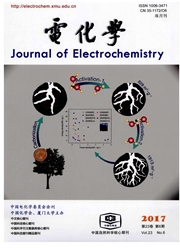

 中文摘要:
中文摘要:
研究全钒液流电池的质子传导膜制备过程,提出高分子亲水/疏水相互作用诱导溶液相分离的成膜原理,进行制膜工艺放大,满足全钒液流电池的电堆制造与储能工程应用需要.突破现有"离子交换"传质机理的限制,利用电解液中不同价态钒离子与氢离子相比,存在体积和荷电量的差异,通过离子"筛分"和"静电排斥"效应进行离子选择性渗透.制成孔径分布在4~7 nm的聚偏氟乙烯质子传导膜,电导率为3.5×10-2S·cm-1,爆破强度高于0.3 MPa,面积800 mm×900 mm.利用扩散实验测定膜对H+/VO2+离子选择性,选择性系数达到306.利用该质子传导膜组装的15 k W电堆,充电/放电循环性能稳定,电流密度达到100 m A·cm-2,在700多个循环过程电流效率为93%,能量效率超过72%,具备产业化应用前景.
 英文摘要:
英文摘要:
The polymeric hydrophilic/hydrophobic interactions into membrane formation were introduced. A general and straightforward strategy for preparing membranes with nanometer-scale pores was suggested by utilization of hydrophilic/hydrophobic interactions to generate phase separation and removal of polyion aggregates through water immersion. Poly(vinylidene fluoride)(PVDF) and sodium allyl sulfonate(SAS) serve as the membrane material and pore-generator, respectively, resulting in chemically stable and oxidation-resistant membranes with various potential applications. Following the same procedure invented to produce the laboratory-scale membranes, the scale-up process to manufacture large-area membranes was completed. The obtained membrane exhibited the conductivity of 3.5×10-2S·cm-1, thickness of 100 μm, bursting strength over 0.3 MPa and effective area of 800 mm×900 mm.In order to investigate whether this membrane is capable of assembling vanadium flow battery(VFB) stack, the permeation selectivity for H+/VO2+mixtures through the membranes, made from different pore-generator contents, were measured. Obviously,proton transports through membrane far faster than vanadium ion. Since the volume of H+is much smaller than that of VO2+in electrolyte, the difference in charge exclusion effect, which distinguishes from general ion exchange mechanism due to Donnan equilibrium effect, leads to the selectivity for H+/VO2+up to 306. Using this nano-porous membrane, a 15 k W VFB stack was fabricated to evaluate the membrane performance for application. Generally, the stack test indicates that the membrane provided feasible proton permeation and rejection of vanadium ion, with average columbic efficiency of 93% and energy efficiency of 72% during the period of over 700 charge/discharge cycles, which shows promising market potential for electricity energy conversion and storage processes.
 同期刊论文项目
同期刊论文项目
 同项目期刊论文
同项目期刊论文
 期刊信息
期刊信息
